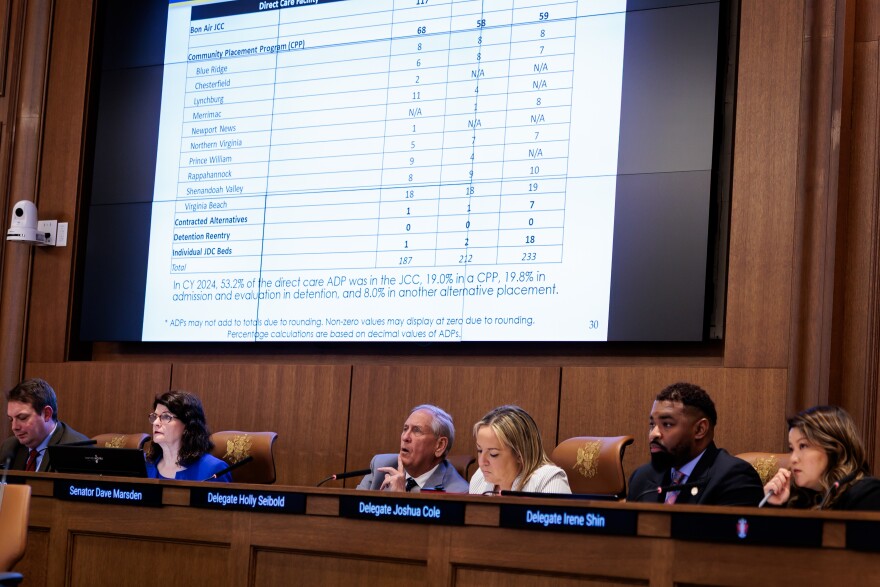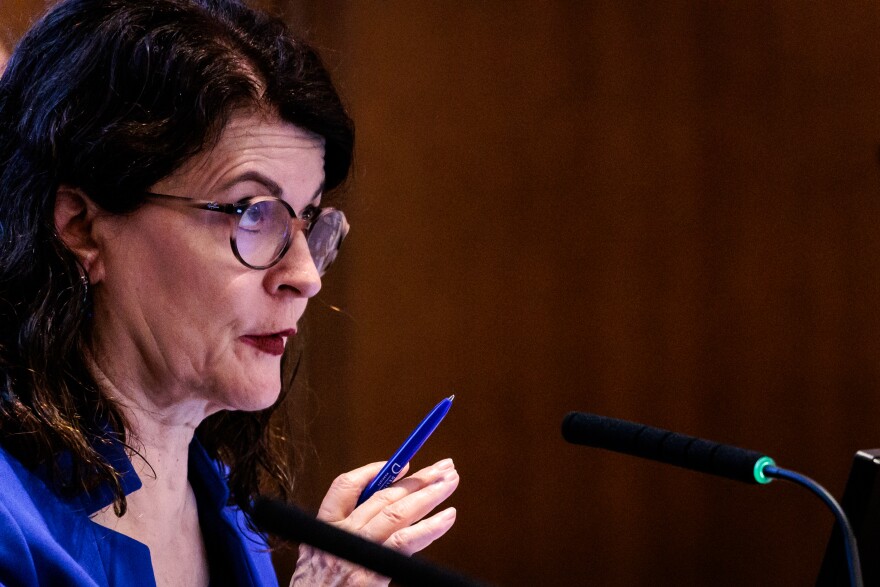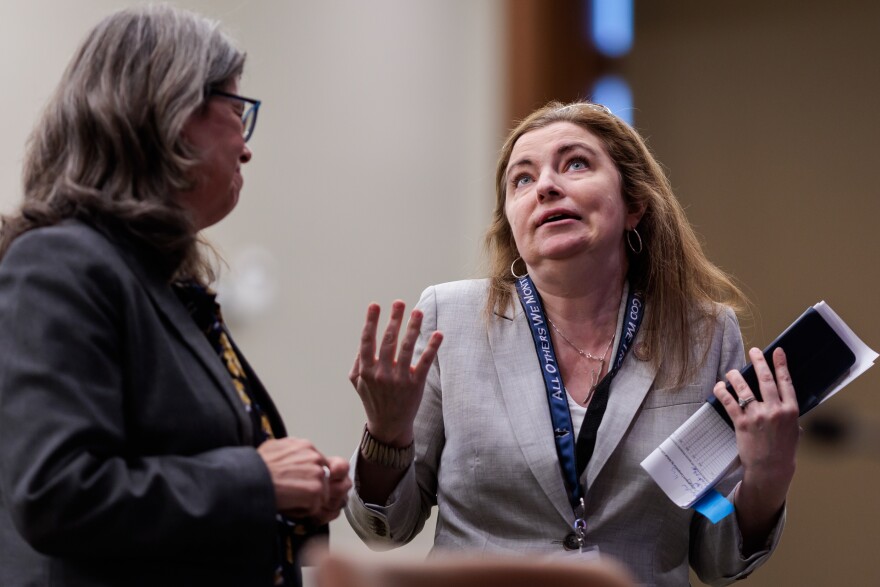The moment she heard her son’s voice over the phone, she knew his time inside the state-run Bon Air Juvenile Correctional Center was taking a toll.
Her teenage son has been at the facility in Chesterfield County, the only state-run juvenile correctional center, for less than a year. When he called on March 24, he said he’d been on lockdown for four days.
“He said, ‘Mom, this place is not good. My mental health has gone downhill the entire time that I've been here, I'm not getting the help that I need,’” said the mother, who VPM News is not identifying due to concerns over retribution.
The Virginia Department of Juvenile Justice, which runs the Bon Air facility, has defined its mission as enhancing “public safety by providing effective accountability measures and interventions that improve the lives of” youth.
The mother said she drives from near Hampton Roads to Chesterfield for every available visitation — and would put more money toward the boy’s access to an unsupervised phone line, if he was allowed to call more than three times a week for 10 minutes.
“The major concern at that facility is staffing, which then snowballs,” the mother said. “It's affecting the kids' mental health. It's affecting their schooling. It's affecting their access to communication with their family, exercise and showers.”
A state Senate report last year indicated the staff vacancy rate at Bon Air JCC was 50.8%.
The mother continued: “Locking these kids up in a cell for four to six days at a time, without any exercise, without getting out for one hour, they're just locked in a cage.”
VPM News emailed DJJ about this allegation, but did not receive a response.

Virginia DJJ and the Commission on Youth
At Monday’s DJJ board meeting, members called for transparency and insight into what’s unfolding at Bon Air JCC.
DJJ Director Amy Floriano was not present at the board meeting. VPM News was later told she was not able to make it due to a medical appointment. As a result, DJJ Legislative and Regulatory Affairs Manager James Towey said he would take questions from the board and later respond in writing.
“We keep getting these [concerns] as a board — what can we do?” board secretary Synethia White asked, referencing a packet of complaints she and the board received from Valerie Slater, executive director of RISE For Youth. “What additional things are being addressed in the facility that we may not be aware of?”
Vice chair Scott Kizner again called for an independent review of Bon Air, as he did during a November 2024 meeting: “Not sure why there is such a reservation, but there seems to be reservation.”
After the meeting, Kizner told VPM News that calling for a third-party investigation is not about pointing fingers or blaming anyone, but rather acknowledging shared responsibility.
'Because boredom creates mischief.'
“I very much would like to know that the young people are taken care of, that they're safe, that the day is structured in a way that doesn't create boredom,” he said. “Because boredom creates mischief.”
The following day, the Virginia Commission on Youth unanimously voted for an independent inquiry. State Sen. Barbara Favola (D–Arlington) — who serves as youth chair on the panel — said she’s set to write Gov. Glenn Youngkin a letter calling for the investigation.
Floriano attended this second meeting, but declined to participate in this story.
The commission wants the investigation to provide information on systemic and structural issues at the facility, in addition to specific recommendations on how DJJ can improve its practices.

“We can't have any more stories of youth feeling so desperate that they start fires in their cells … [or that they’re] locked in their cells for a whole weekend in solitary confinement,” Favola said. “It's not helpful for our youth. It does not embrace the rehabilitative mission of [DJJ].”
During the meeting, some panel members critiqued Floriano's presentation, which largely served as an overview of the entire agency rather than focusing on specific issues, like understaffing and reported lockdowns at Bon Air JCC.
Floriano’s presentation lasted over an hour — more than double the allotted time.
Del. Carrie Coyner (R–Chesterfield), the commission’s co-chair, said she sent Floriano a letter prior to Tuesday’s meeting outlining 16 questions she wanted answers to. Instead of answers, Coyner said, Floriano’s presentation resembled a curated social media feed — highlighting only what the department wanted the commission to see.
“I think someone ought to sit [down],” Coyner said, following Floriano’s presentation. “If you're going to argue that kids are not kept in their rooms, that things aren't happening because they're bored and they aren't going to school regularly.”
Favola pressed Floriano on staffing levels and allegations of youth being placed on lockdown for entire weekends due to limited staffing. (DJJ has withheld specific staffing numbers.)
The director said the facility’s had 10 lockdowns since August 2023, describing a full lockdown as “locking the facility down” for “24 to 48 hours.”
According to Floriano, in addition to mandated quarterly lockdowns, youth at the facility also are subject to “modified lockdowns,” “administrative holds” and “temporary security of the youth” — each involving children being placed in their rooms.
Floriano said she could not address anonymous allegations of lockdowns potentially being misused. But the DJJ director did address another concern, saying that while on lockdown, juveniles are given “hygiene kits” in lieu of being allowed to shower.
Transparency
“Transparency has been a challenge, not only with DJJ — I mean, we look at the Department of Corrections, which incarcerates adults, and transparency has also been an issue there,” Del. Rae Cousins (D–Richmond) told VPM News during a March interview.
VPM News sent a Freedom of Information Act request to the department, seeking five pieces of information; DJJ denied each request, citing the privacy of minors.
In the department’s response, while declining to release the information, it acknowledged the existence of the following documents between October 2024 and March 2025: 85 serious injury reports; 15 reports made by Bon Air JCC officials to law enforcement; 39 pages of grievances and responses to undefined allegations; 1,243 pages of disciplinary reports; and 19Kb of data documenting physical restraint being used on minors held at the facility.
WTVR also recently reported a former Bon Air JCC officer was charged with sexually assaulting a minor who was held there.
Cousins visited the correctional facility following the Super Bowl Sunday fire and told VPM News she was asked to sign a nondisclosure agreement, which included a provision preventing her from speaking about anything that happened during the visit.
VPM News asked a DJJ representative for confirmation of the NDA, but did not receive a response.
“I'm comfortable saying that we did not learn any additional information other than what DJJ has sort of already publicly stated and included in their reports,” Cousins said.
Cousins, who’s also an attorney at BrownGreer in Richmond, said a possible avenue to ensure transparency would be to pass legislation creating a dedicated ombudsman office for DJJ. The Virginia Department of Corrections has a similar independent office that investigates complaints.
“It is very tough to sort of reconcile what we're hearing on the ground from advocates with the progress that DJJ has sort of presented when we ask questions or when we visit,” Cousins said. “It does make it hard to determine what is actually happening.”

‘It’s unfair’
Families are considered a “major cornerstone” for residents’ successful rehabilitation, according to the department’s orientation handbook.
“You are valued and appreciated as stakeholders in your child’s future. Your involvement and support is one of the most powerful tools we have in making a difference in your child’s life; therefore, our intervention efforts within the facility are far more likely to be successful if you are a part of them,” the handbook states.
But the Hampton Roads mother said DJJ is a barrier to parental involvement and support, and has routinely canceled visitations to the facility without notification.
She said the department also stopped allowing video chats. And although her son is in good standing, there’ve been times when he’s been disallowed from accessing an unsupervised line to make a call home.
When she calls or emails the facility, she said, her concerns go unresolved.
“It's just been very, very difficult trying to have a space to be able to be his parent and speak for him, and have him navigate and speak for himself,” the mother said.
She said the situation is “depressing, it's upsetting, it's unfair.”
Her son, she said, has faced several issues since entering Bon Air: a lack of promised counseling services; room restriction affecting his mental health; and access to education and recreational activities being limited.
'They're sleeping in locked cells. They're in concrete units with hard concrete floors that look just like adult prison cells.”
“There's been no counseling services. He just started,” the mother said, despite his being at the facility for almost a year. “They have changed staff so often to where they have not been able to start his court-mandated services.”
A judge gave her son a blended sentence: He started serving his term at Bon Air JCC under DJJ, but will complete it in an adult facility — though under Virginia code, a judge can suspend the adult sentence. But the Hampton Roads mother said he wants to request a transfer to a VADOC facility — a prison for adults.
Amy Walters, senior attorney and co-interim director of the youth justice program at the Legal Aid Justice Center, said the organization began hearing about the conditions at Bon Air JCC during the pandemic.
“[In] 2022 and 2023, we started hearing more and more about restrictions on education, time out of room, enrichment,” Walters said. “Our first step was to reach out to the department and ask for a meeting, and I think the night before, they canceled that meeting.”
As a result, LAJC has spent the past year advocating with DJJ board members, who Walters said should assume responsibility for oversight of the facility.
“They wonder why they have so many issues at Bon Air. It's because [DJJ is] putting kids in cells and [they’re] leaving them there for six days at a time,” the Hampton Roads mom said. “They're not getting access to anything that is going to help them in the future.”
Through her experience with the juvenile justice system, the Hampton Roads mother has found refuge and some relief among a group of people going through similar situations.
Every week, she joins a video call with other parents who have incarcerated children. The Hampton Roads mother said: “We are all going through the same thing with our children there at Bon Air.”
What happens next?
Without oversight and increased transparency from DJJ, advocates have said, there’s no clear path to addressing the current issues at Bon Air.
“We're in a place right now that's dangerous. And no matter everyone's positive intention, it just doesn't seem that things are working as well as they should be,” Andy Block, former DJJ director, told VPM News recently. “In fact, things seem a little precarious, and hopefully everybody can come together and try to get things to a safer place.”
As two panels this week have met to discuss what’s been going on at Bon Air, the families of youth incarcerated in Chesterfield County are left wondering how many problems will occur before real change happens.
“I want to make change for my son [and] for all of the other kids in there that are not having access to their family members, which is the core of their support — their family,” the Hampton Roads mother said. “We don't get to access our children enough.”
The Commission on Youth is set to meet again on May 6. The next DJJ board meeting has not yet been scheduled.
Part 3 of “Idleness and boredom” will be published next week, focusing on the Bon Air facility’s history and how other states manage juvenile incarceration.
























